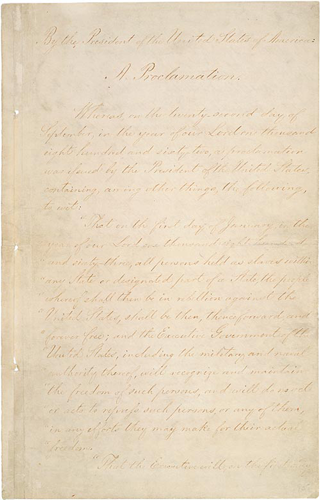Teach This Poem, though developed with a classroom in mind, can be easily adapted for remote learning, hybrid learning models, or in-person classes. Please see our suggestions for how to adapt this lesson for remote or blended learning. We have also noted suggestions when applicable and will continue to add to these suggestions online.

Read the Emancipation Proclamation.
The following activities and questions are designed to help your students use their noticing skills to move through the poem and develop their thinking skills so they understand its meaning with confidence, using what they’ve noticed as evidence for their interpretations. Read more about the framework upon which these activities are based.
-
Warm-up: (think, pair-share) What does beauty mean to you? How do beauty standards impact society? How do the standards impact people your age?
-
Before Reading the Poem: (Teachers, you may wish to partner with a history teacher or have your students read and learn more about the Emancipation Proclamation prior to class.) Read the transcript of the Emancipation Proclamation. Why is it important? What words or phrases from the proclamation stand out? Why? What questions do you have?
-
Reading the Poem: Silently read “Emancipation Queen” by Rio Cortez. What do you notice about the poem? Note any words or phrases that stand out to you or any questions you might have.
-
Listening to the Poem: Enlist two volunteers and listen as the poem is read aloud twice, and write down any additional words and phrases that stand out to you.
-
Small Group Discussion: Share what you noticed about the poem with a small group. How does the poem connect to the resource and discussion from the beginning of class? What does this poem say about beauty?
-
Whole Class Discussion: How does the epigraph “‘Emancipation Queen’ was a historically Black beauty pageant in Utah” inform your understanding of the poem? What do you think of the lines “a Black girl / on a stage / inside the egg / of a robin?” How might the robin and the egg connect to the pageant?
-
Extension for Grades 7-8: What is the significance of writing about and exploring beauty? Choose one or more poems to read. After reading, how have your thoughts on beauty changed or stayed the same from the beginning of class? Why? Share with your classmates.
-
Extension for Grades 9-12: Read the essay “Notes Toward Beauty” by Reginald Shepherd. Write your own creative response about beauty. Share your response with the class.
Use DocsTeach, an online tool from the National Archives, to help you approach teaching the Emancipation Proclamation. Find teaching activities that incorporate this document, or create your own online activity.
